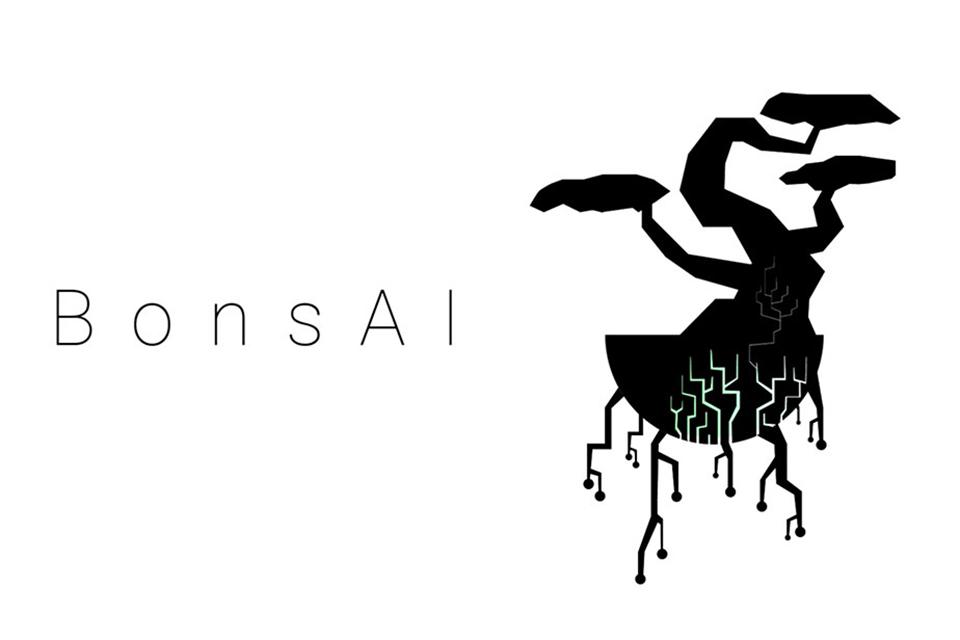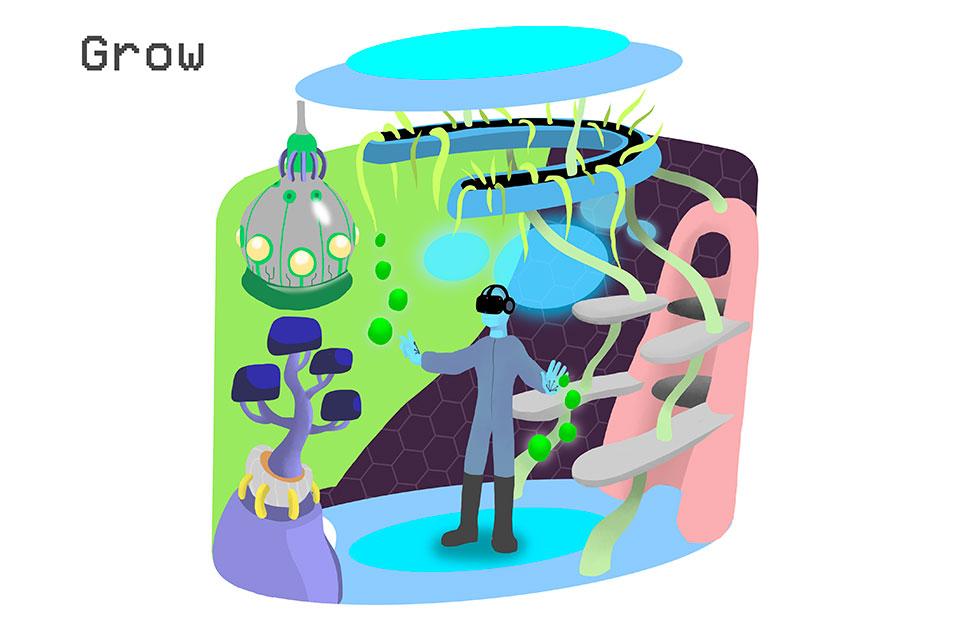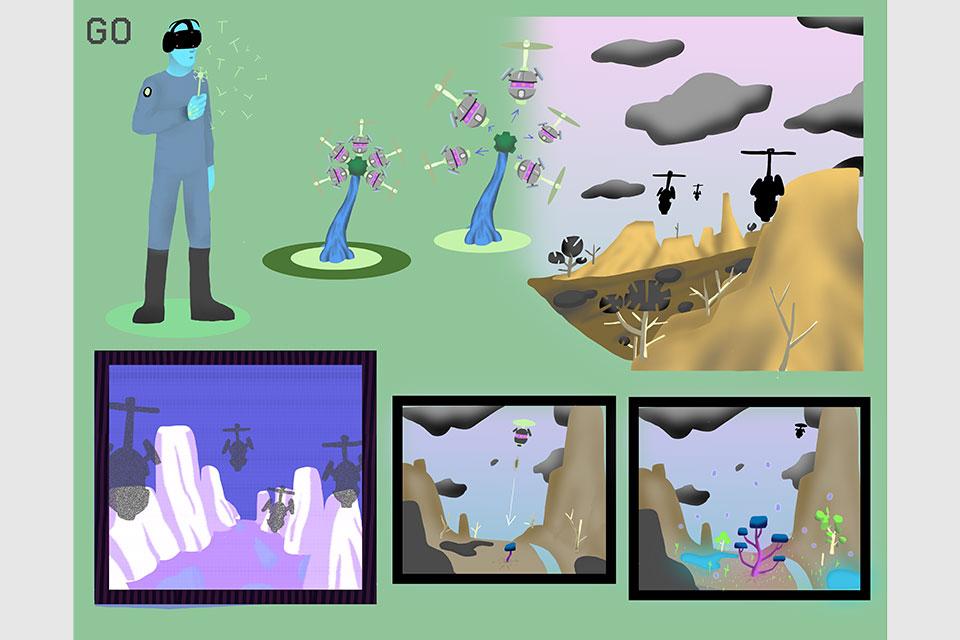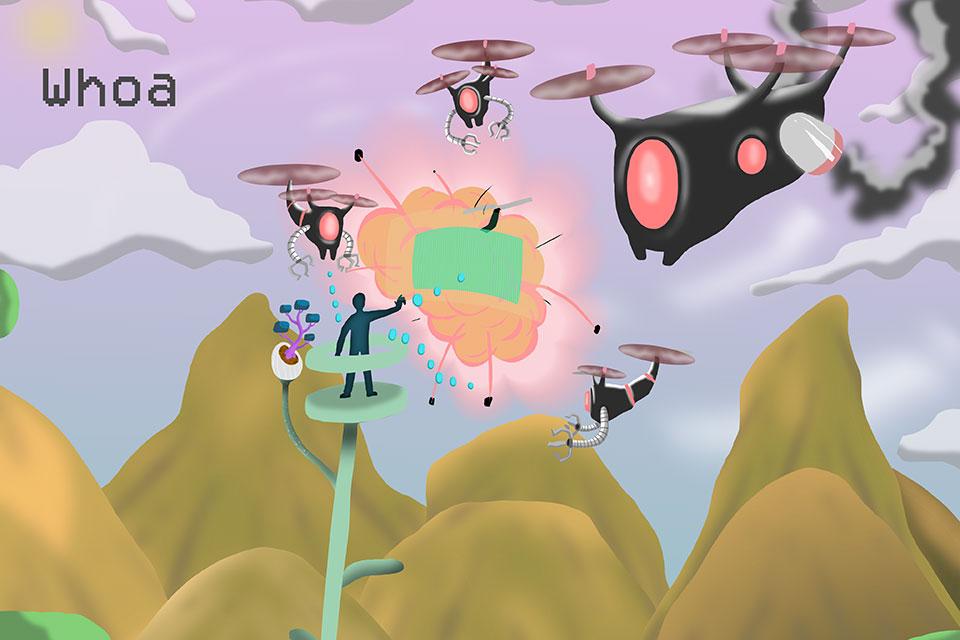METL residents blend expertise to create new immersive experience
Over the last several months, three resident artists have been diligently working to create an impactful, one-of-a-kind virtual reality experience as part of the School of Filmmaking's Media and Emerging Technology Lab’s (METL) first-ever residency program. The team, which consists of a 3D technical artist, software engineer and screenwriter, are less than two months away from completing the project, but paused to reflect with us on their work thus far, their creative processes and collaborating through a global pandemic.
A benefit to the creative community
The six-month Immersive Storytelling Residency program brings together the individual expertise of the three residents, with the ultimate goal of creating a fully-realized virtual reality experience by utilizing the technology and resources available at METL.
“Our focus with METL is to apply emerging technology for storytelling and content creation,” says Ryan Schmaltz, METL’s director. The idea for the residency developed from a need he saw arising in the burgeoning industry. “There are so many people with ideas, but without the resources to further develop their concepts.”
What the residency does is bring those people together, give them room to develop an idea and provide guidance and mentors along the way. And at the end, you have this really interesting immersive experience that brings benefit to our community and the industry.
Ryan Schmaltz
And, he adds, “A screenwriter may not know any developers, or a developer may not know a technical artist. What the residency does is bring those people together, give them room to develop an idea and provide guidance and mentors along the way. And at the end, you have this really interesting immersive experience that brings benefit to our community and the industry.”
The residency program is a natural complement to the School of Filmmaking's undergraduate and graduate curriculum. "METL operates as part of UNCSA’s School of Filmmaking, and each informs and enhances the other through shared resources," says Henry Grillo, Interim Dean of the School of Filmmaking. "The residency program contributes to that collaboration by exploring and creating comprehensive projects that reach beyond the limits of the traditional classroom, connecting the residents in a collaborative, creative environment and generating content that enriches the learning opportunities for our film students."
The first cohort of METL residents includes Fernando Goyret, a technical artist; Alex Moro, a software engineer; and UNCSA Filmmaking alumnus Trent Spivey, a screenwriter.
An animated virtual reality film
The team was first charged with developing a concept for their final product that met a few broad guidelines, while leaving space for creativity and innovation. “We were tasked with thinking about how we could use this immersive technology and platform to cultivate empathy and awareness, while still creating an entertaining and meaningful experience—all within about an eight to 12 minute timeframe,” says Spivey.
The project, an animated virtual reality (VR) film called “BonsAI,” is set in the not-so-distant future, and is based around the idea that the person immersed in the VR experience is embodying a botanist, “operating on the fringes of biology and artificial intelligence (AI).” As the botanist, “you work secretly to thwart a menacing new plant virus. As you orchestrate your solution, you must evade the reach of your former employer: a global agribusiness with a keen interest in your work.”
Project development has taken place over several months. Watch the residents' June 2020 video update below:
Bringing the project concept to fruition has involved a massive amount of research, exploration of technology, virtual collaboration and discipline. The three residents shared their thoughts on this work and how the residency has helped them explore their own goals:
Q&A with the METL residents
How is the residency supporting your personal and professional goals?
Trent Spivey: I’m striving to be a lifelong student, learning how different media types work on our bodies and minds to entertain, inform and inspire. There’s a transformative power in the experiences we have with others and with the world around us. If artists can one day fluently work with that power in media like VR, I think we’ll start to see a world where audiences better understand the connections between themselves and everyone/thing around them.
This time with Alex and Fernando is helping me build my personal “experience fluency,” and I don’t know of anywhere else I could do that with so much freedom. I’m also learning about the technical and business demands of creating something in a new part of the media landscape.
Fernando Goyret: The residency has given me the opportunity to research several of the subjects that I feel are very important in training for my professional goal, which is to be a professor. Dealing with VR development and cutting-edge technologies is directly related to graphic design development.
Alex Moro: My goal is to create experiences. The residency supports this goal by providing time, space and connection.
What have you learned from each of your fellow residents?
Fernando: With Trent, I learned the art of communication and accurate expression of thought; his organizational skills have been extremely valuable to me. Alex provides technical direction and helps me to think logically through the creative process. Not only that, but he put together my super computer. Both of them are extremely competent creative individuals and I am fortunate to count them as my colleagues and friends.
Alex: From Trent, empathy and team collaboration. From Fernando, a refreshing Brazilian attitude and perspective.
Trent: I’ve never met anyone with Alex’s ability to break complex technical issues into manageable pieces, not to mention his in-depth knowledge of the software that we’re using to make our experience. The rhythm and process of developing a VR experience feels like equal parts filmmaking, video game design, and planning a surprise party—Alex has taught us a lot about how to plan our time and achieve milestones at a healthy rate of speed.
Fernando’s perspective on any story or design challenge has so been insightful. Beyond his title as technical artist, Fernando’s approach to artmaking is refreshing because it’s unlike anything I learned in film school. There’s a certain curiosity and perseverance in him that’s very humbling.
What has been the biggest challenge so far?
Trent: COVID-19! Like everyone else on the planet, we had no idea how much the pandemic would shake up our lives. We’re profoundly grateful that the university prioritized everyone’s safety, even if it meant getting used to only seeing each other over Zoom for a while. We also faced one of VR’s most common creative challenges: maintaining a clear, coherent artistic intent AND giving audiences enough agency to feel like they get a unique experience.
Fernando: The biggest challenge has been to work through the pandemic without face-to-face contact. All of the mentors have done a great job of making us feel at ease and gave great input on the project. The most exciting part for me is the production part, where we gather all of our ideas and concepts and give birth to the final product.
Can you talk about one of your mentors and what you’ve learned from them?
Alex: I’mma shout out Navid Khonsari, a knowledgeable industry veteran who currently runs a studio specializing in story driven experiences. He contributed excellent feedback during the ideation phase.
Trent: Kent Bye is an incredible thinker and journalist who travels to every major immersive industry event. I don’t think it’s hyperbolic to say that he has probably experienced and examined more VR content than anyone else, ever. I’ve kept up with his podcast for years, thinking that maybe I’d meet him one day. When Ryan casually mentioned that we’d be meeting with him, I had to work to keep my composure. After presenting one of our early ideas to Kent, he offered the kind of feedback that might have very well taken our project from okay to great. There’s really no one like him.
Note: Other mentors the residents spoke about have provided guidance and expertise in VR, filmmaking, music, plant science and other areas. They include:
- Jacquie Barnbrook, producer of “The Martian VR Experience”
- Jim Fairchild, musician and lead guitarist of Modest Mouse
- Bob Keen, special effects chair in the UNCSA School of Filmmaking
- Eric Mathis, a microbiologist at the farm at Crossnore, a North Carolina-based children’s home and school
- Zahra Rasool, head of Al Jazeera Contrast and lead creator of the “Still Here” VR experience
What part of the “BonsAI” project are you most excited about?
Alex: We are making use of hand tracking on the Quest [VR headset]; previously you’d use motion controllers to simulate hands. I’m excited to further explore this new mode of interaction.
The way we’re trying to blend art, science and pure entertainment will hopefully lead folks to see that a lot is possible when we combine ideas and fields of study that have been held apart for so long.
Trent Spivey
Trent: I can’t wait to see how "BonsAI" might spark new thoughts or conversations about a positive future. The way we’re trying to blend art, science and pure entertainment will hopefully lead folks to see that a lot is possible when we combine ideas and fields of study that have been held apart for so long.
On the horizon
The first Immersive Storytelling Residency wraps up at the end of August, and details about how the UNCSA community can experience “BonsAI” will be released in the coming months.
Learn more about the work of METL and support the 2021 residency program on the METL website.
Get the best news, performance and alumni stories from UNCSA.
SUBSCRIBE TO OUR NEWSLETTERS
July 9, 2020






